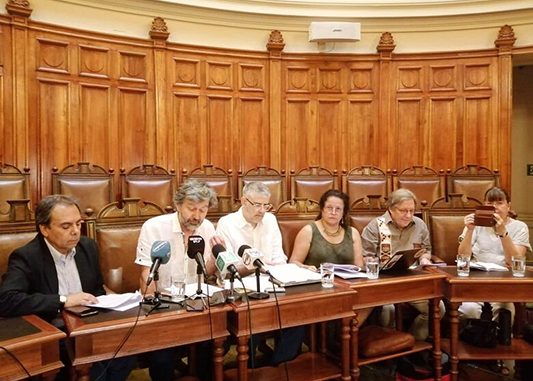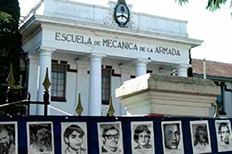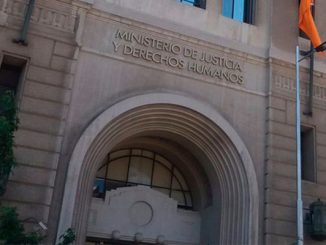
«Three months after the beginning of the social outburst and despite the recommendations of international missions and national social organizations, human rights violations and repression continue, and they occur in a context of intimidation of the population and criminalization of the social protest». With these categorical statements, the Canadian Observer Mission defines the serious human rights violations that occur in our country.
The mission, which was composed of members of the Quebec and Canadian parliaments, trade union and civil society representatives, researchers and academics, concluded that «although the figures in the latest report from the National Human Rights Institute (NHRI) reveal that human rights violations observed by this body have fallen in comparison to those that occurred during the state of emergency, It is noted that these violations continue in a constant and systematic way, concentrating on specific spaces and social sectors of the country» and they add that «the data and testimonies that we have collected indicate that, although the official statements minimize the gravity of the situation, the critical state of these is maintained and aggravated by a cumulative effect. Furthermore, progress in terms of respect for human rights in the practices of the police forces has yet to be made, this,
in a context in which the Chilean political regime remains locked in a deep crisis of legitimacy».
Taking into account the number of deaths, injuries, wounded and detained during these 100 days, the Mission emphasized the absence of consolidated and verifiable figures, blaming the government authorities for this failure. Marcos Ancelovici, academic at the University of Quebec in Montreal (UQAM), pointed out that «there is a lack of reliable and precise data that can be used, the sources are diverse, such as the prosecutors’ offices, ombudsmen’s offices, human rights organisations, but they have different protocols, some are based on what is observed, therefore what is not observed is not quantified. We insist there are fragmented sources and there is no global picture. «There is government responsibility in this,» Ancelovici said, adding that «therefore we have the impression that the magnitude of human rights violations is greater. The figures are below reality and the reality is much more serious».
In addition, they noted attacks on journalists and media workers, which violate the right to information; attacks on first aid volunteers and human rights observers; they questioned judicial procedures and especially preventive detention to punish people against whom there is not necessarily the required evidence. They pointed out in their report the absence or negligence in the application of protocols by the Police. In addition to expressing alarm at the violence and sexual abuse committed, the use of tear gas «in entire neighbourhoods affecting the health and well-being of large sectors of the population (whether or not they participated in demonstrations), including women, the elderly, children and the disabled. We note that this practice is regularly used in marginal populations and is experienced by neighborhood residents as a collective punishment and a form of intimidation.
We have been able to confirm – states the Mission in a public communiqué delivered at the Congress in Santiago – that human rights violations occur on a daily basis to this day. Some examples are as follows:
During the early morning hours of the New Year in Valparaiso, the young physical education teacher Matías Orellana, lost an eye and suffered a skull fracture after being hit by a tear gas canister by the Police;
On January 11, Nicolás Ríos Verdugo, 20 years old, was arrested in downtown Santiago,
allegedly by Police in civilian clothes. According to the testimony of his family, the young man was kidnapped,
beaten and threatened with torture and rape. He is now in custody for 60 days;
On Friday, January 17, 2020, 4 new victims of eye trauma are reported;
On Monday, January 20, 2020, 16-year-old Matías Yáñez was arrested near a march in Valparaíso, beaten, mistreated, threatened in a Police vehicle and his mother was denied information about his detention for many hours .
The Canadian Mission adds in its statement that «The information gathered in the interviews indicates that this is systematic and massive repression.
The level of systematization is difficult to assess precisely, but the data and testimonies collected indicate the presence of recurrent and similar repressive practices from one place to another, which manifest a common pattern. Beyond the most visible cases, this systematisation is also revealed in the multiplication of human rights violations of lesser connotation, which gradually install an anti-democratic approach. On the other hand, a phenomenon of retraumatization is observed, as practices inherited from the dictatorship are relived. Despite the high number of complaints, legal actions, internal investigations and administrative procedures for human rights violations, very few cases have been formalized and there have been very few rulings».
In view of this, Isabel Orellana, a specialist in socio-ecological conflicts, from theThe Université du Québec à Montréal, when consulted, indicated that «civil society actors have pointed out that there are problems that have not been resolved since the time of the dictatorship. There is an unresolved problem of justice and reparation, and that the current situation has to do with it and that what is happening today is added to what has happened and this is particularly serious». She added that the Mission addressed the issues of human rights from the perspective of social, political, economic, cultural and environmental rights and from this perspective we consider the environmental and ecological crisis and the human rights crisis to be serious, as exemplified by the issue of water and the rights of indigenous peoples».
Faced with this extremely critical situation, the Canadian Mission «raises the question of the will, leadership and concrete action of the government to stop and put an end to human rights violations». Focusing the responsibilities on those who have the duty to safeguard and protect the human rights of the population.
In their preliminary resolutions, international observers point out that «the reports of international bodies have already strongly denounced these violations and have formulated a series of recommendations. What more does the government need to implement them? How will the new anti-looting, anti-barricade and anti-masks and the protection of critical infrastructure laws contribute to improving the human rights situation in Chile? And on the other hand, how to respond to the social demands that have been expressed in a convincing way by the citizens and that have generated the social outburst», asks the Mission in its statement clearly raising its concerns for the coming days, especially in view of the already announced mobilizations for the month of March and the press reports announcing police preparations to control the social mobilization.
For this reason, the Canadian Mission adds that «from our perspective, the priority seems to be to criminalize social protest, as a way to demobilize the population, instead of really facing the social inequality and the important structural problems that the events of the last months have revealed.»
Faced with this extremely critical situation, the Canadian Mission «raises the question of the will, leadership and concrete action of the government to stop and put an end to human rights violations». Focusing the responsibilities on those who have the duty to safeguard and protect the human rights of the population.
In their preliminary resolutions, international observers point out that «the reports of international bodies have already strongly denounced these violations and have formulated a series of recommendations. What more does the government need to implement them? How will the new anti-sweeping, anti-barricade and anti-capital infrastructure protection laws contribute to improving the human rights situation in Chile? And on the other hand, how to respond to the social demands that have been expressed in a convincing way by the citizens and that have generated the social outburst», asks the Mission in its statement clearly raising its concerns for the coming days, especially in view of the already announced mobilizations for the month of March and the press reports announcing police preparations to control the social mobilization.
For this reason, the Canadian Mission adds that «from our perspective, the priority seems to be to criminalize social protest, as a way to demobilize the population, instead of really facing the social gap and the great structural problems that the events of the last few months have revealed.
«Faced with this context,» observers point out, «we are not optimistic. The data and testimonies that we have collected point to a dysfunction of the Chilean institutions that feed a systemic impunity and the mistrust of the population. From the interviews we can see that the terms «crimes against humanity» and «state terrorism» are repeatedly mentioned to qualify the situation».
The Mission highlighted the social networks that have been built up in the communities themselves. There is – indicated Isabel Orellana – «a monumental effort made by grassroots civil society organizations to respond to the emergency through volunteerism. There is a determination by the population to take a situation of social and humanitarian crisis into their own hands in the absence of attention, and this is very valuable».
When asked about the systematic nature of human rights violations, they pointed out that they are also systemic, given that not only are the authorities minimizing the seriousness of the problem, but there are certain common patterns of repressive action and a certain degree of complementarity in the actions of the State. Denise Gagnon, union representative of the Quebec Federation of Workers (FTQ), said «we saw that there is not only a single model but also a practice in action, and also an agreement over time. A demonstration is announced and immediately there is a repressive machinery that is set in motion and acts,» and she added as a union representative «freedom of expression, the right to assembly, the right to express frustrations and social demand are systematically rejected. This violence is far from diminishing and is a recurrent occurrence.
For his part, Pierre Mouterde, essayist and philosopher at the Limoilou College, added that «when we saw the performance of the Police we had the impression that they were acting in a similar way to an occupying force with systematic violations of human rights and with a people who are unable to defend themselves.
That was very powerful for us, listening to the testimonies, to all those people for so many days and it was very moving for us».
Observers said they conducted 65 hours of interviews in Santiago, Antofagasta and Valparaiso, between January 18 and 26, with 99 people from 51 organizations, and confessed to having been shocked by the repression in popular neighborhoods in Antofagasta. They consider it «fundamental to contribute our solidarity to the people of Chile and to denounce the disconcerting and unacceptable silence of our own government: the government of Canada. Unlike the government of Quebec, which has expressed its solidarity with the people of Chile and taken a clear position in favour of the defence of human rights, the federal government of Justin Trudeau has so far shown excessive discretion». In their statement, they ask «whether this timidity on the part of the Canadian government has anything to do with Canada’s significant financial investments in Chile, especially in the mining sector. We are counting on the members of our Mission to raise these questions in the parliaments of Quebec and Canada».
The Canadian Mission met with human rights organisations such as CODEPU, London 38, Citizen Observatory, and dozens of other student, trade union, women’s and professional organisations, victims of repression, parliamentarians and authorities, including the Sub-secretariat for Human Rights of the Ministry of the Interior.
The Canadian Mission was composed of:
– Sol Zanetti, Member of Parliament for the Quebec Solidare Party in the Quebec National Assembly
– Simon-Pierre Savard-Tremblay, Member of Parliament for the Bloc Quebecois Party in the Canadian Parliament;
– Denise Gagnon, union representative of the Federation of Workers of
Quebec (FTQ) and president of the Salvador Allende de Quebec Foundation;
– Luc Allaire, head of international relations at the Central des syndicats du Québec –
(CSQ );
– Ricardo Peñafiel, union representative of the Central Council of Montreal Metropolitan
National Trade Union Centre (CSN) and the National Federation of Teachers of Quebec ;
– Marie-Christine Doran, researcher at the School of Political Studies, director of the
investigation into the criminalization of social protest, University of Ottawa;
– Isabel Orellana, member of the board of the Centre for Research in Education and Training
in Environment and Eco-citizenship, specialized in socio-ecological conflicts, of the
Université du Québec à Montréal ;
– Marcos Ancelovici, Researcher, Department of Political Science, Director of the Chair of Canadian Research in Sociology of Social Conflict, Université du Québec à
Montréal ;
– Pierre Mouterde, essayist and philosopher at the Limoilou College
CODEPU Team
January 27, 2020
Translated from the Spanish by the Place de la Dignité Collective



